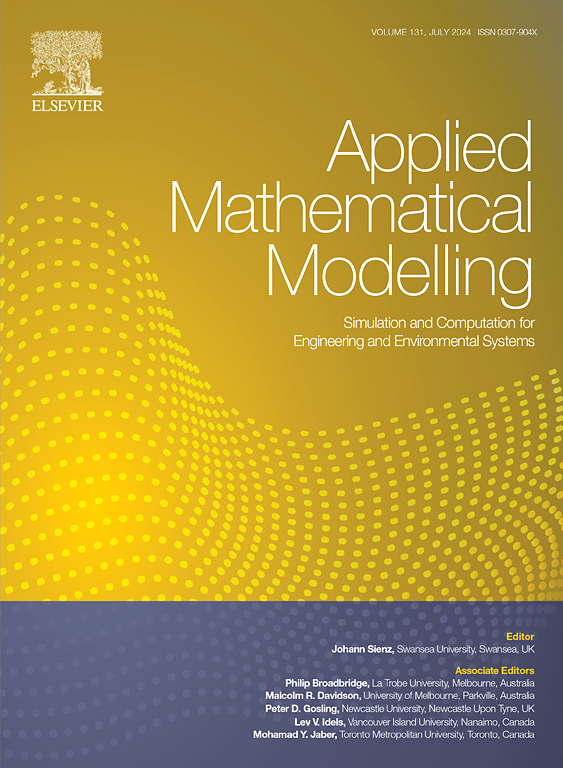Evolutionary dynamics of information diffusion with sending-receiving interactions
IF 4.4
2区 工程技术
Q1 ENGINEERING, MULTIDISCIPLINARY
引用次数: 0
Abstract
In this paper, we systematically investigate the evolutionary dynamics of information diffusion with sending and receiving interactions in both well-mixed and structured populations. We propose an evolutionary game-theoretical model that captures the dual roles of individuals as both senders and receivers, examining not only the strategies of individuals as senders (to send or not to send) but also their strategies as receivers (to accept or deny). By using replicator dynamics, we find that there exists a stable coexistence state between the strategies of “not sending-accepting” and “not sending-denying” in well-mixed populations, with the “sending-accepting” strategy failing to emerge. Furthermore, we theoretically demonstrate that the stable coexistence state is robust against parameter variations. However, in structured populations, we derive a critical mathematical condition under which the emergence of the “sending-accepting” strategy is promoted. This finding highlights the importance of population structure in facilitating efficient information dissemination. Besides, to validate our theoretical results, we conduct computer simulations. All simulation outcomes are in agreement with the theoretical predictions.
具有发送-接收交互作用的信息扩散演化动力学
在本文中,我们系统地研究了在混合良好和结构良好的种群中,发送和接收交互作用下信息扩散的进化动力学。我们提出了一个进化博弈论模型,该模型捕捉了个体作为发送者和接收者的双重角色,不仅检查了个体作为发送者(发送或不发送)的策略,还检查了他们作为接收者(接受或拒绝)的策略。通过复制因子动力学分析,我们发现在混合良好的种群中,“不发送-接受”和“不发送-拒绝”策略存在稳定共存状态,“发送-接受”策略不会出现。此外,我们从理论上证明了稳定共存状态对参数变化具有鲁棒性。然而,在结构化群体中,我们得出了一个关键的数学条件,在这个条件下,“发送-接受”策略的出现被促进了。这一发现突出了人口结构在促进有效信息传播方面的重要性。此外,为了验证我们的理论结果,我们进行了计算机模拟。模拟结果与理论预测基本一致。
本文章由计算机程序翻译,如有差异,请以英文原文为准。
求助全文
约1分钟内获得全文
求助全文
来源期刊

Applied Mathematical Modelling
数学-工程:综合
CiteScore
9.80
自引率
8.00%
发文量
508
审稿时长
43 days
期刊介绍:
Applied Mathematical Modelling focuses on research related to the mathematical modelling of engineering and environmental processes, manufacturing, and industrial systems. A significant emerging area of research activity involves multiphysics processes, and contributions in this area are particularly encouraged.
This influential publication covers a wide spectrum of subjects including heat transfer, fluid mechanics, CFD, and transport phenomena; solid mechanics and mechanics of metals; electromagnets and MHD; reliability modelling and system optimization; finite volume, finite element, and boundary element procedures; modelling of inventory, industrial, manufacturing and logistics systems for viable decision making; civil engineering systems and structures; mineral and energy resources; relevant software engineering issues associated with CAD and CAE; and materials and metallurgical engineering.
Applied Mathematical Modelling is primarily interested in papers developing increased insights into real-world problems through novel mathematical modelling, novel applications or a combination of these. Papers employing existing numerical techniques must demonstrate sufficient novelty in the solution of practical problems. Papers on fuzzy logic in decision-making or purely financial mathematics are normally not considered. Research on fractional differential equations, bifurcation, and numerical methods needs to include practical examples. Population dynamics must solve realistic scenarios. Papers in the area of logistics and business modelling should demonstrate meaningful managerial insight. Submissions with no real-world application will not be considered.
 求助内容:
求助内容: 应助结果提醒方式:
应助结果提醒方式:


